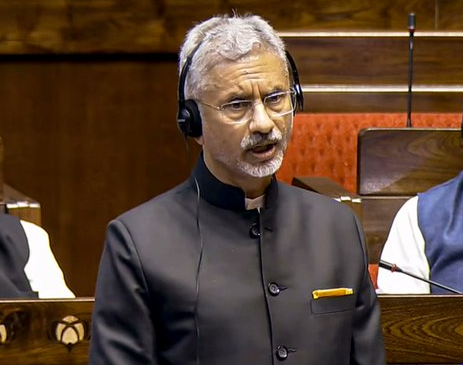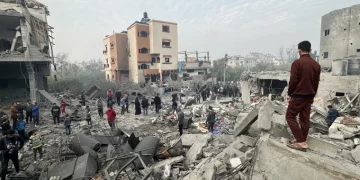New Delhi: Countries have right to respond to situations but they should be mindful of civilian casualties and must observe humanitarian laws, External Affairs Minister S Jaishankar told Rajya Sabha Thursday.
Responding to supplementaries during the Question Hour regarding India’s position on the ongoing conflict between Israel and Palestine, he said, “We condemn terrorism, we condemn hostage-taking. We do believe countries have the right to respond to the situation but countries should be mindful of civilian casualties. They must observe humanitarian law and we would like a ceasefire and an early end of violence.”
When asked the reason for India’s abstention from a resolution in the UN General Assembly on October 27, 2023, regarding the protection of civilians and upholding legal and humanitarian obligations, Jaishankar said there were many resolutions in the UN General Assembly and in some India abstained and in some, it voted in favour.
According to him, there are several reasons to abstain such as a resolution is not balanced, it is more divisive, it can set a precedence which has consequences for India or it has larger implications.
“In this particular case, we felt that the resolution was not well-drafted and not well-considered. We had reservations on the language. Our concern was not accommodated. That is why we abstained,” he said.
Responding to TMC MP Saket Gokhle, who asked about India’s position on a ban imposed by the Israeli government on the UN aid agency UNRWA and how India is sending aid to Palestine, Jaishankar said the government has stood by its decision to send humanitarian aid and it has just released the latest tranche of support to the UNRWA.
He further asked that India always supported a two-state solution and in the UN, India abstained on a resolution against Israeli illegal settlement in the West Bank.
What is India’s position on the illegal settlement made by Israel in the West Bank in Palestine,” Gokhale asked.
“Regarding the two-state solution, we supported the two-state solution. We have been public and unambiguous about that. There should be no cause for confusion regarding a two-state solution,” Jaishankar answered.
He reiterated that the wording of resolutions is important for deciding to support them.
Talking about the October 27, 2023 resolution, he said, “There was no reference to terrorism. There was no reference to hostage-taking. In our mind if a resolution doesn’t reflect the entirety of a situation, it is not a balanced resolution. A country like India which is itself a victim of terrorism, if we countenance the fact that terrorism is underplayed and ignored, it is not in our interest that we do so (support).”
When asked about India’s position on the International Court of Justice’s warrant against Israel Prime Minister Benjamin Netanyahu, former Israel Defence Minister Yoav Gallant and a Hamas leader for war crimes, the minister said, “India is not a member of the International Criminal Court. When the International Criminal Court was constituted, the question of our membership was considered. For very good reason and after a great deal of deliberation, India decided not to become a member. With regard to any decision passed by the ICC, it is not binding on us.”
Highlighting India’s humanitarian assistance to Palestine, he said New Delhi has given assistance to people of Palestine at this particular time by making an annual contribution of $5 million to UNRWA the main assistance-providing agency.
“This amount traditionally used to be $1 Million. This government decided to raise it from $1 million to $ 5 million,” he said.
Jaishankar added that India has provided 70 metric tonnes of aid of which 16.5 was of medicine in 2023.
“We have given 65 metric tons of medicines to the Palestinian Authority and UNRWA in 2024. We have provided 33 metric tons of medicine to Lebanon,” he said.
PTI







































